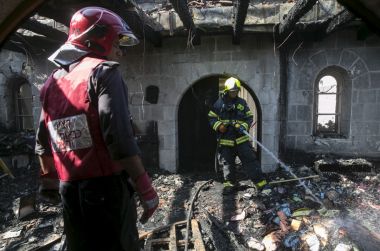Rabbis back crowdfunding project to restore destroyed church

The "loaves and fishes" church in Tabgha on the Sea of Galilee is to be rebuilt in a crowdfunding project backed by rabbis across Israel.
The "restoring friendship" initiative represents an attempt to restore relations between Jews and Christians in the area after the church was damaged. Its associated encounter centre was also destroyed in a fire believed to have been started by Jewish extremists.
The church is in the area where, according to Christian tradition, Jesus took five loaves and two fish and miraculously fed a crowd of 5,000 come to hear him preach.
The encounter centre was where the Benedictine monks who are the church's custodians met with visitors including people of different faiths. However, the monks were careful never to proselytise and worked to develop friendship and understanding.
Besides 17 senior rabbis, the rebuild project is backed by the Elijah Institute of Jerusalem, by the Speaker of the Knesset and by the Patriarchate of Jerusalem.
Israel's Mimoona website reported that the arson took inter-religious hatred between the two faiths to new heights and was the first time that Jews had burned a church in the name of scripture. "We can not remain silent in front of the manifestations of hatred between religions in the name of religion. We must show the world that, for those affected, and above all to ourselves, Judaism is not a religion of hatred," the website said.
Alon Goshen-Gottstein, founder and director of the Elijah Interfaith Institute, which is backing the project, wrote in a Huffington Post blog that in the past four years, 42 churches, mosques and monasteries have been vandalised, attacked or torched in the Holy Land.
"A very narrow section of the Orthodox Zionist world has engaged in what is in fact religious terrorism. Initially a form of political protest, that channeled hatred of the religious other as part of its political message, it has taken an ugly turn and become an outright attack on other religions," he wrote.
He said the destruction at Tabgha was not only greater than any other instance of arson, it was also a watershed point in terms of the reasoning provided because in previous incidents, the graffiti has always been political.
"This time, a verse from the Jewish prayers was quoted, expressing the hope that all idols will perish, leaving God alone as the only true reality. The arsonists sprayed this verse on the walls of the monastery, thereby sharing with us their religious worldview, that identifies Christianity with idolatry and that seems to empower them to action, beyond future oriented hope."
Although the arson was widely denounced, the Christian community in the area has become increasingly insecure, he said. "For all the condemnation that such acts draw, the acts of vandalism and terror draw on deep seated religious views and it is these that must be tackled if we seek to bring about a healing to this malady."
He wrote that in contemporary Israeli society there is a "general ignorance" not only of Christianity but also of the range of possible attitudes to Christianity.
He added: "The initiative turns out to have been important for all those who felt the need to affirm a different kind of Judaism than that of the arsonists. It has become a vote in favour of a peace-seeking Judaism, that affirms and recognises others, a Judaism that recognises that without proper treatment of minorities, it loses the basis for its own existence. "











